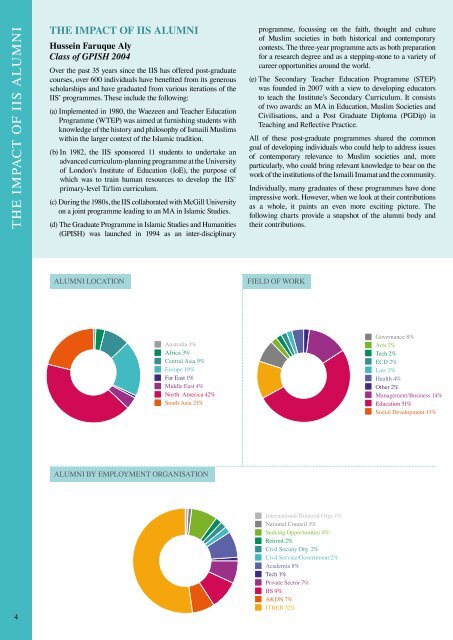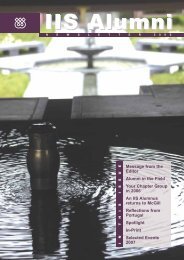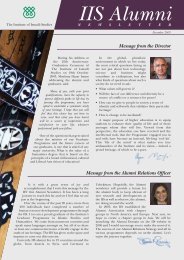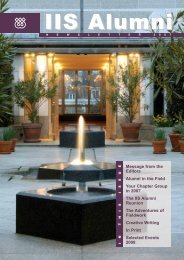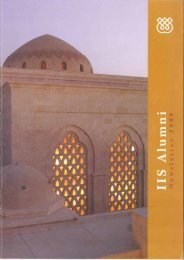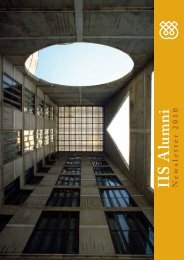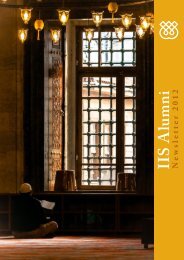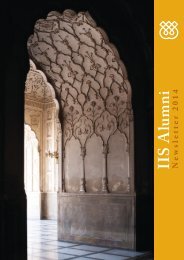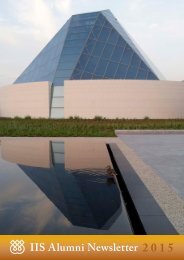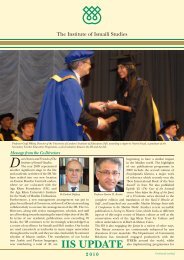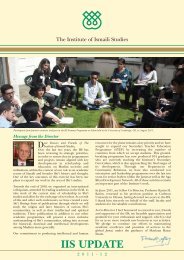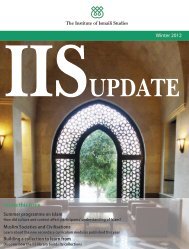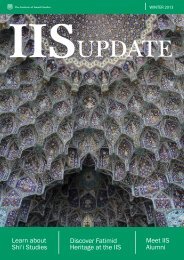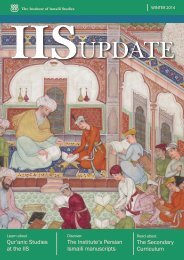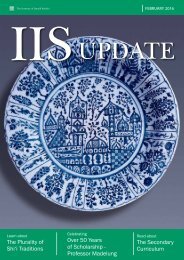IIS Alumni Newsletter 2017
Create successful ePaper yourself
Turn your PDF publications into a flip-book with our unique Google optimized e-Paper software.
THE IMPACT OF <strong>IIS</strong> ALUMNI<br />
THE IMPACT OF <strong>IIS</strong> ALUMNI<br />
Hussein Faruque Aly<br />
Class of GPISH 2004<br />
Over the past 35 years since the <strong>IIS</strong> has offered post-graduate<br />
courses, over 600 individuals have benefited from its generous<br />
scholarships and have graduated from various iterations of the<br />
<strong>IIS</strong>’ programmes. These include the following:<br />
(a) Implemented in 1980, the Waezeen and Teacher Education<br />
Programme (WTEP) was aimed at furnishing students with<br />
knowledge of the history and philosophy of Ismaili Muslims<br />
within the larger context of the Islamic tradition.<br />
(b) In 1982, the <strong>IIS</strong> sponsored 11 students to undertake an<br />
advanced curriculum-planning programme at the University<br />
of London’s Institute of Education (IoE), the purpose of<br />
which was to train human resources to develop the <strong>IIS</strong>’<br />
primary-level Ta‘lim curriculum.<br />
(c) During the 1980s, the <strong>IIS</strong> collaborated with McGill University<br />
on a joint programme leading to an MA in Islamic Studies.<br />
(d) The Graduate Programme in Islamic Studies and Humanities<br />
(GPISH) was launched in 1994 as an inter-disciplinary<br />
programme, focussing on the faith, thought and culture<br />
of Muslim societies in both historical and contemporary<br />
contexts. The three-year programme acts as both preparation<br />
for a research degree and as a stepping-stone to a variety of<br />
career opportunities around the world.<br />
(e) The Secondary Teacher Education Programme (STEP)<br />
was founded in 2007 with a view to developing educators<br />
to teach the Institute’s Secondary Curriculum. It consists<br />
of two awards: an MA in Education, Muslim Societies and<br />
Civilisations, and a Post Graduate Diploma (PGDip) in<br />
Teaching and Reflective Practice.<br />
All of these post-graduate programmes shared the common<br />
goal of developing individuals who could help to address issues<br />
of contemporary relevance to Muslim societies and, more<br />
particularly, who could bring relevant knowledge to bear on the<br />
work of the institutions of the Ismaili Imamat and the community.<br />
Individually, many graduates of these programmes have done<br />
impressive work. However, when we look at their contributions<br />
as a whole, it paints an even more exciting picture. The<br />
following charts provide a snapshot of the alumni body and<br />
their contributions.<br />
ALUMNI LOCATION<br />
FIELD OF WORK<br />
Australia 1%<br />
Africa 3%<br />
Central Asia 9%<br />
Europe 19%<br />
Far East 1%<br />
Middle East 4%<br />
North America 42%<br />
South Asia 21%<br />
Governance 8%<br />
Arts 2%<br />
Tech 2%<br />
ECD 2%<br />
Law 2%<br />
Health 4%<br />
Other 2%<br />
Management/Business 14%<br />
Education 51%<br />
Social Development 13%<br />
ALUMNI BY EMPLOYMENT ORGANISATION<br />
4<br />
International/Bilateral Orgs 1%<br />
National Council 1%<br />
Seeking Opportunities 8%<br />
Retired 2%<br />
Civil Society Org. 2%<br />
Civil Service/Government 2%<br />
Academia 8%<br />
Tech 1%<br />
Private Sector 7%<br />
<strong>IIS</strong> 9%<br />
AKDN 7%<br />
ITREB 52%


